DNS Benchmark
Ever wondered if your DNS servers are affecting your internet speed? Wonder no more. DNS Benchmark is a free tool that tests the performance of your internet service provider’s (ISP) DNS servers (or any others). GRC’s DNS Benchmark can reveal if slow DNS performance is dragging down your online experience.
A DNS (Domain Name Server) is crucial for browsing the internet. DNS servers, also known as nameservers or resolvers, translate domain names into numeric IP addresses, and without them, your online activities would be limited.
ad
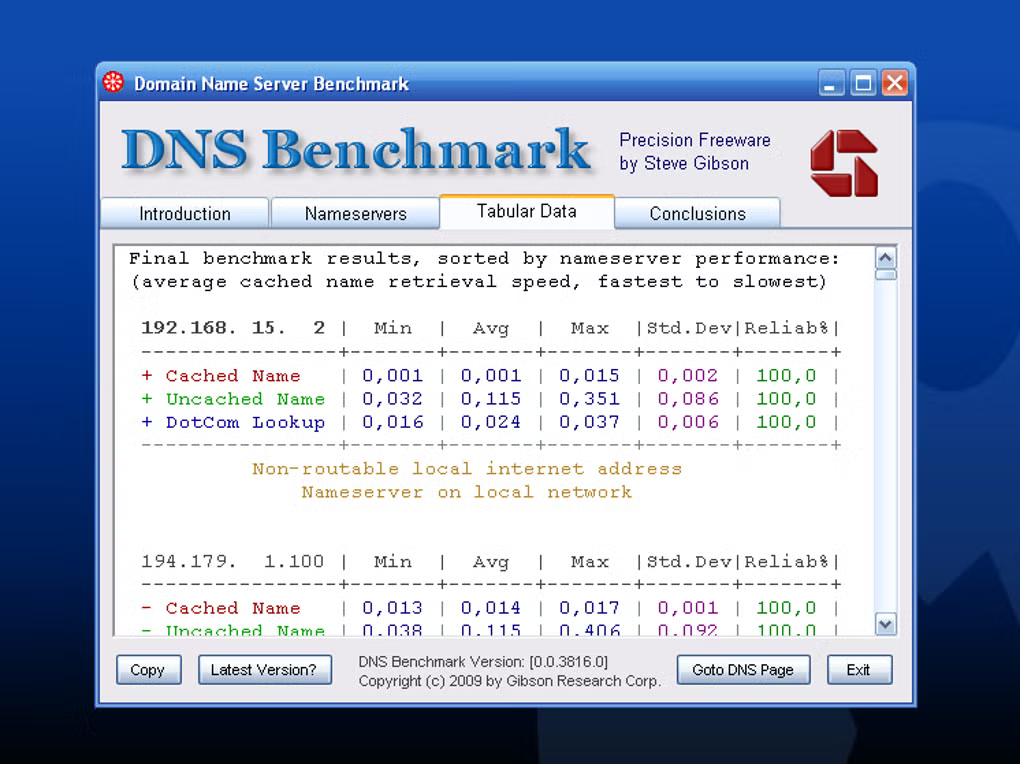
Typically, your ISP provides DNS servers that your devices use by default. But how can you tell if they’re the best choice compared to other public alternatives?
DNS Benchmark software helps by analyzing the performance of your system’s current DNS servers. It compares their performance against well-known public alternatives, both local and remote, giving you a clear picture of their speed.
Armed with this information, you can improve your DNS performance by choosing the best servers for your needs. Keep in mind that your location and ISP influence DNS speed.
ad
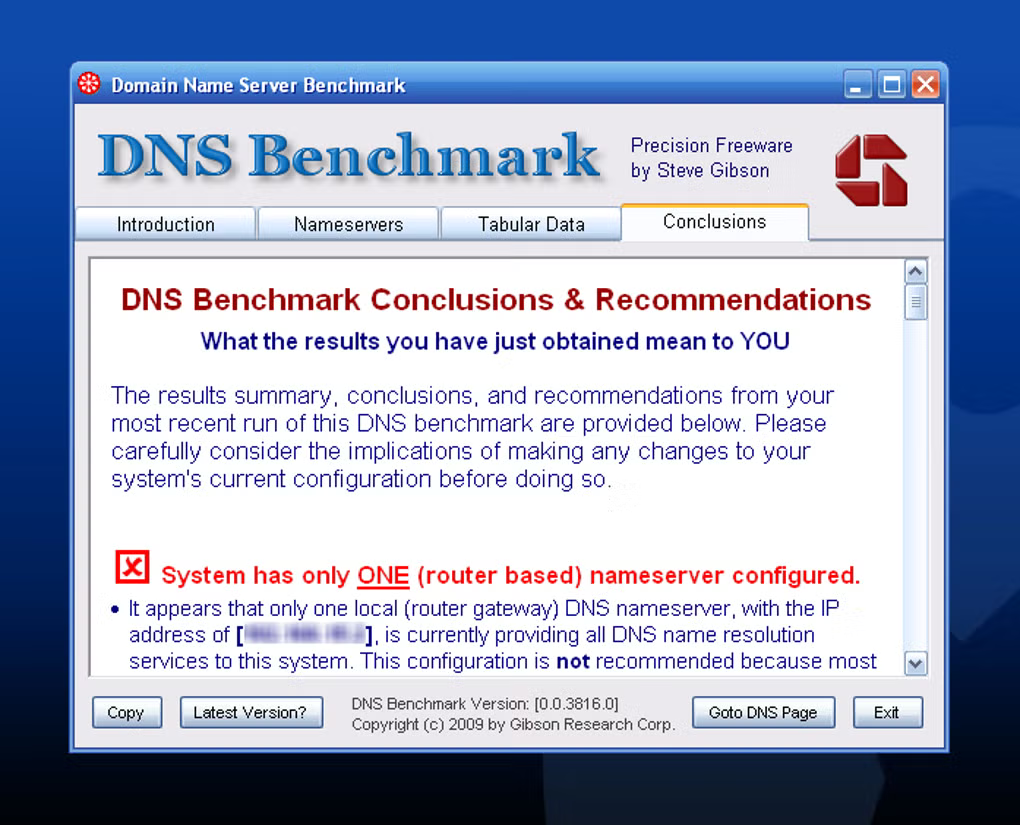
Developed by Gibson Research Corporation (GRC), DNS Benchmark is easy to download for Windows (including Windows 10) and Linux. It’s a lightweight tool (only 147 KBytes) that requires no installation—just download, run, and launch it. DNS Benchmark won’t modify your system.
Alternatives to DNS Benchmark include Namebench, DNS Jumper, Windows DNS Changer, and Simple DNS Plus. However, DNS Benchmark is not available for Mac or iPhone.
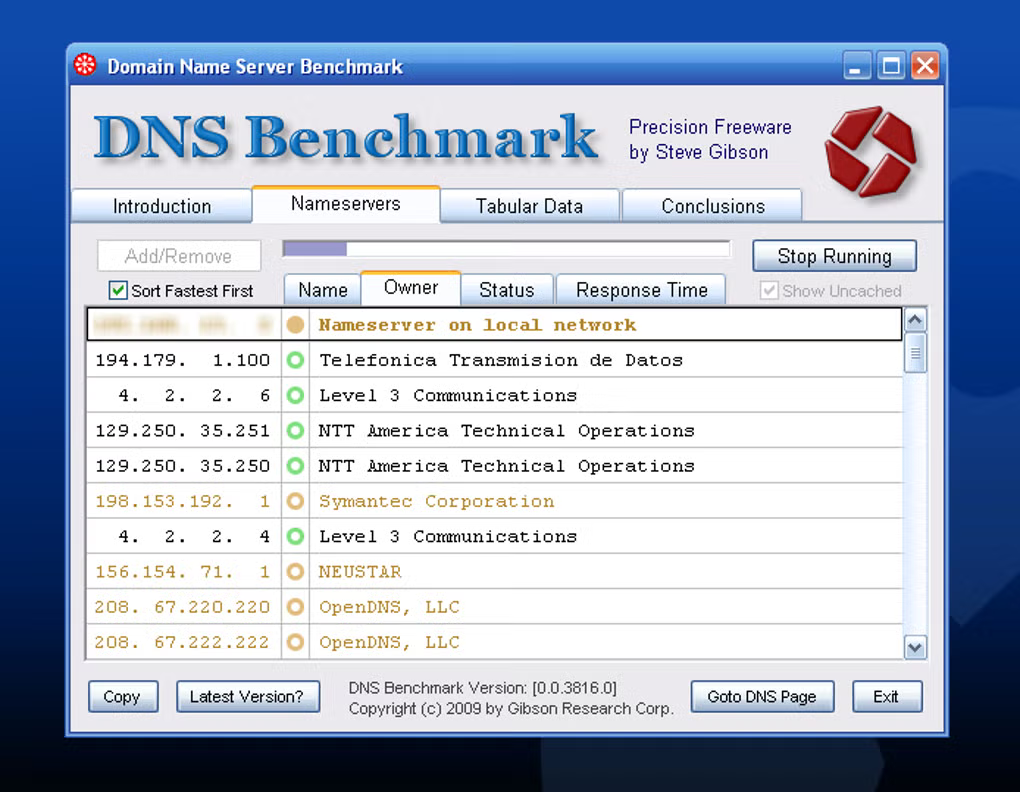
Features and Highlights
- Cached lookups: Measures the time to return a domain name already stored in the resolver’s name cache.
- Uncached lookups: Measures the time to return a subdomain name not yet stored in the resolver’s name cache.
- Dotcom lookups: Measures the time to consult the nameserver’s dotcom resolver(s) for a dotcom domain.
- Reliability: Tracks the number of queries that received no response during the benchmark.
- Optionally verifies whether nameservers support DNSSEC (DNS Security) record authentication.
- Benchmarks DNSSEC authentication performance when using a list of provided DNSSEC-signed domains.
- Provides easy-to-read bar charts comparing all four benchmark parameters.
- Offers on-the-fly hierarchical sorting of results, based on cached (default), uncached, and dotcom performance.
- The bar chart is auto-scaled, but users can manually adjust it for easier comparison between charts.
- Pop-up “inspector” (left-click in nameserver list) reveals exact values on the bar chart.
- Includes a detailed tabular report for non-graphical data analysis.
- Allows export of full, internationalized CSV results for detailed reporting.
- Automatically logs results to CSV files for long-term monitoring and data collection.
- Compares the performance and reliability of up to 200 DNS nameservers simultaneously.
- Identifies nameserver network name (reverse DNS), ownership, and operational status.
- Detects whether nameservers intercept and redirect invalid domain names.
- Generates comprehensive conclusions, summarizing findings and recommending potential system changes in clear, readable English.
- All results are statistically analyzed with a 95% confidence level.
- The bottom of the tabular data page features built-in quick-reference help for easy access.
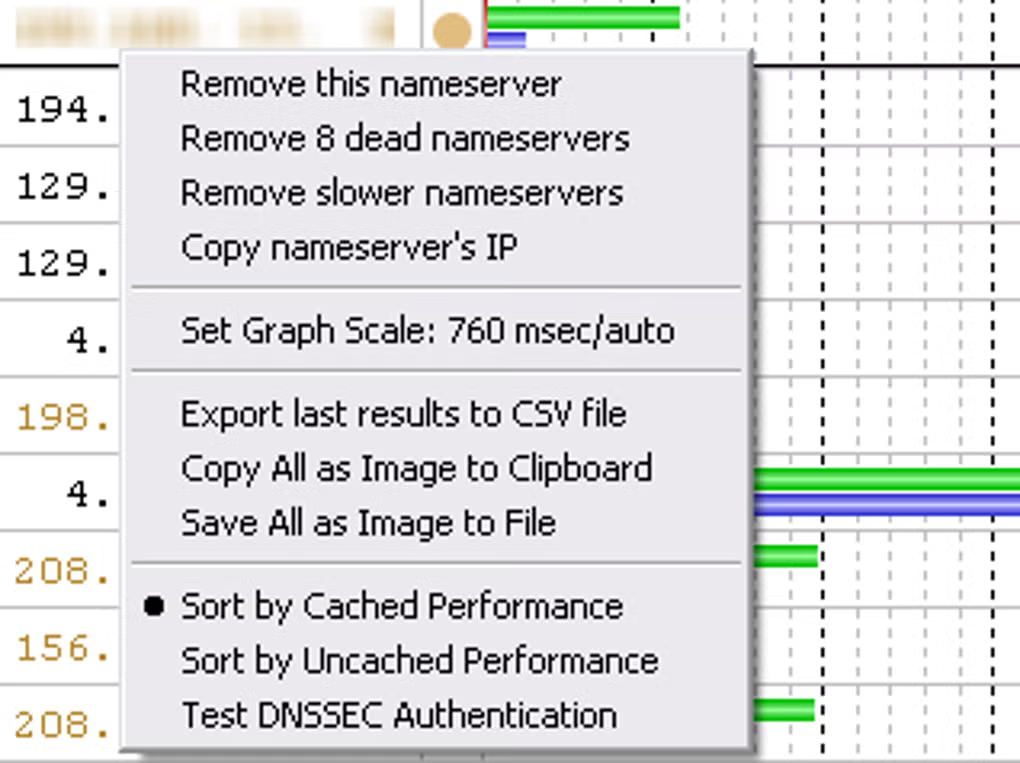
How does DNS Benchmark work?
GRC’s DNS Benchmark is packed with features to meet the needs of even the most advanced internet users. Its more complex options are designed for in-depth DNS performance analysis, which can make it seem overwhelming for casual or first-time users. To help with this, GRC offers extensive online guidance for beginners.
After launching DNS Benchmark, the main window will appear with several tabs at the top. It’s recommended to start by reading the Introduction tab, which offers helpful advice on how to run an effective analysis.
When you’re ready to begin, simply go to the Nameservers tab and click “Run Benchmark.” You can also quickly start or stop the process by clicking the red GRC “G” logo. DNS Benchmark will then conduct a thorough analysis, comparing the performance and reliability of up to 200 DNS nameservers simultaneously.
By default, the tool identifies the DNS nameservers your system is currently using and adds them to a list of publicly available alternatives. Each DNS nameserver is classified to determine its suitability as your DNS resolver.
It’s essential to remember that DNS performance is influenced by your geographic location relative to the nameservers. A server that works well for someone else might not deliver the same speed for you unless you’re in the same area.
To find the fastest DNS servers for you, you need to test them from your own location using a tool like DNS Benchmark. For the most accurate results, ensure that DNS Benchmark is the only program using your internet connection during the test. Pause any streaming services, online gaming, or downloads to get the best possible outcome.
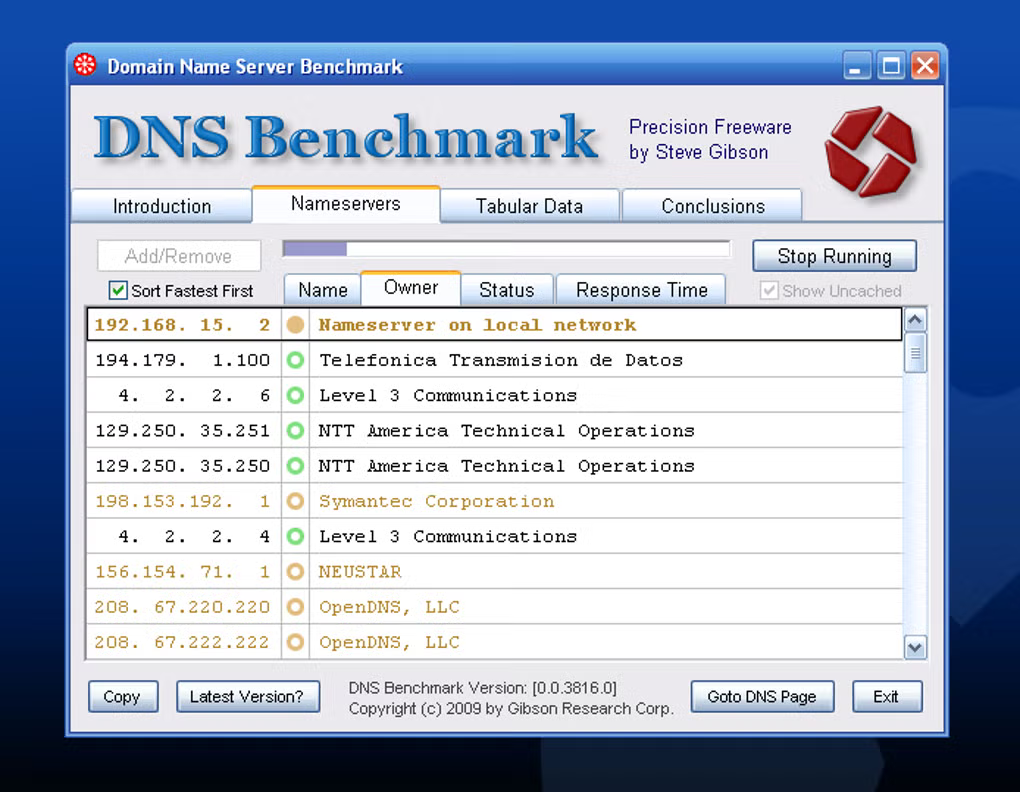
How can I improve DNS performance?
DNS Benchmark will evaluate the performance and reliability of the DNS nameservers your system currently uses and compare them with the alternative servers on its list.
Once the benchmark is complete, non-advanced users should refer to the Conclusions tab. This section provides a detailed yet easy-to-understand summary of key findings and recommendations. You can then use this information to enhance your DNS performance.
Depending on the results, you might choose to reorder the DNS servers your system uses or switch to one or more alternative nameservers if they offer better speed or features. Advanced users can explore the tool’s more complex options to configure their DNS settings to meet specific needs.
Quick and effective DNS testing
A poorly performing DNS server can significantly slow down nearly everything you do online. GRC’s DNS Benchmark is a free, comprehensive, and accurate tool that allows you to test multiple DNS servers. Its analysis can help you enhance your DNS performance, resulting in faster web browsing.
While the program may seem complex for inexperienced users, it provides a Conclusions tab that offers summary information, making it accessible to casual users. This feature, along with the detailed data for experts, makes DNS Benchmark a valuable tool for all users looking to find the fastest DNS server and boost their internet speed.
PROS
- Evaluates the performance of both local and remote DNS nameservers
- Assesses if your ISP’s DNS servers are the best choice
- Offers detailed test result analysis
- Can assist in optimizing DNS performance
- Provides extensive online guidance for casual users
- Includes robust features for advanced users
CONS
- May overwhelm beginners with too much information
FAQ’s
What is DNS Benchmark?
DNS Benchmark is a free utility developed by GRC that tests the performance and reliability of DNS servers. It compares your current DNS servers with public alternatives to determine the fastest and most reliable options, helping to improve your internet speed and overall browsing experience.
How does DNS affect my internet speed?
DNS servers translate domain names into IP addresses. A slow DNS server will delay this process, resulting in slower web page loading times. Optimizing your DNS server can reduce these delays and speed up your browsing experience.
Does DNS Benchmark support DNSSEC?
Yes, DNS Benchmark can verify whether DNS servers support DNSSEC (DNS Security Extensions). It also benchmarks DNSSEC authentication performance using a list of DNSSEC-signed domains.
Can DNS Benchmark help improve my internet speed?
Yes, by identifying faster or more reliable DNS servers, DNS Benchmark can help you switch to a better-performing DNS server, potentially speeding up your internet connection.
Does DNS Benchmark work on all operating systems?
DNS Benchmark is available for Windows (including Windows 10) and Linux. Unfortunately, it is not available for macOS or iOS devices.
What should I do if I find better DNS servers using DNS Benchmark?
After running the test, review the Conclusions tab for a summary of the results. If DNS Benchmark identifies better-performing DNS servers, you can change your system’s DNS settings to use them for improved performance.
Is DNS Benchmark suitable for beginners?
While DNS Benchmark offers advanced features for experienced users, it also includes a Conclusions tab that provides simplified results for beginners. Additionally, GRC offers extensive online guidance to help casual users understand how to use the tool.
Are there alternatives to DNS Benchmark?
Yes, alternatives include Namebench, DNS Jumper, Windows DNS Changer, and Simple DNS Plus. However, DNS Benchmark is known for its comprehensive and detailed analysis, making it a popular choice for many users.
What is the difference between local and remote DNS servers?
Local DNS servers are typically provided by your ISP and are geographically closer to you, while remote DNS servers are public alternatives that may be located farther away. DNS Benchmark tests both types to find the fastest one for your location.
How can I get the best results from DNS Benchmark?
To get the most accurate results, make sure DNS Benchmark is the only application using your internet connection during the test. Pause any streaming services, online games, or downloads to prevent interference.
Conclusion
DNS Benchmark is an essential tool for assessing and improving your DNS server performance. By comparing your current DNS servers with public alternatives, it helps you identify the best options for your internet needs. The software caters to both casual and advanced users, providing clear insights and recommendations to enhance browsing speed and reliability. By utilizing DNS Benchmark, you can ensure a smoother online experience and avoid the frustrations of slow DNS responses.
ad


Comments are closed.